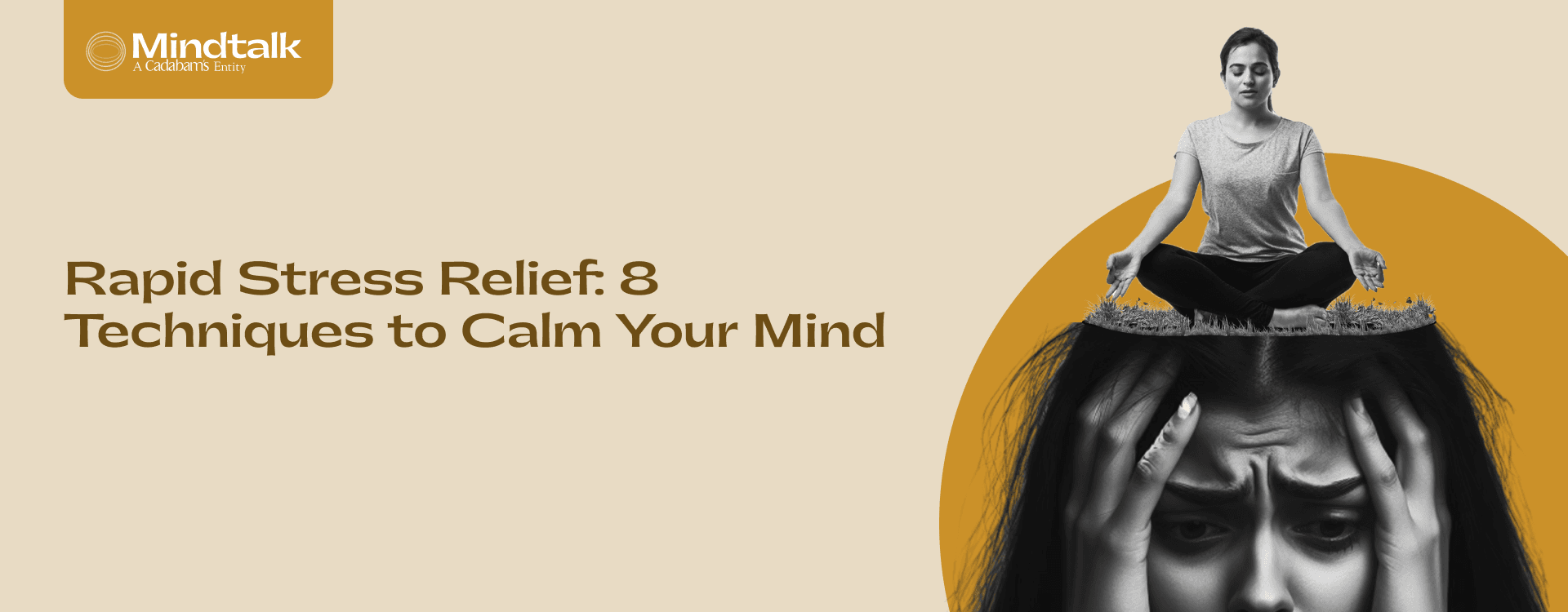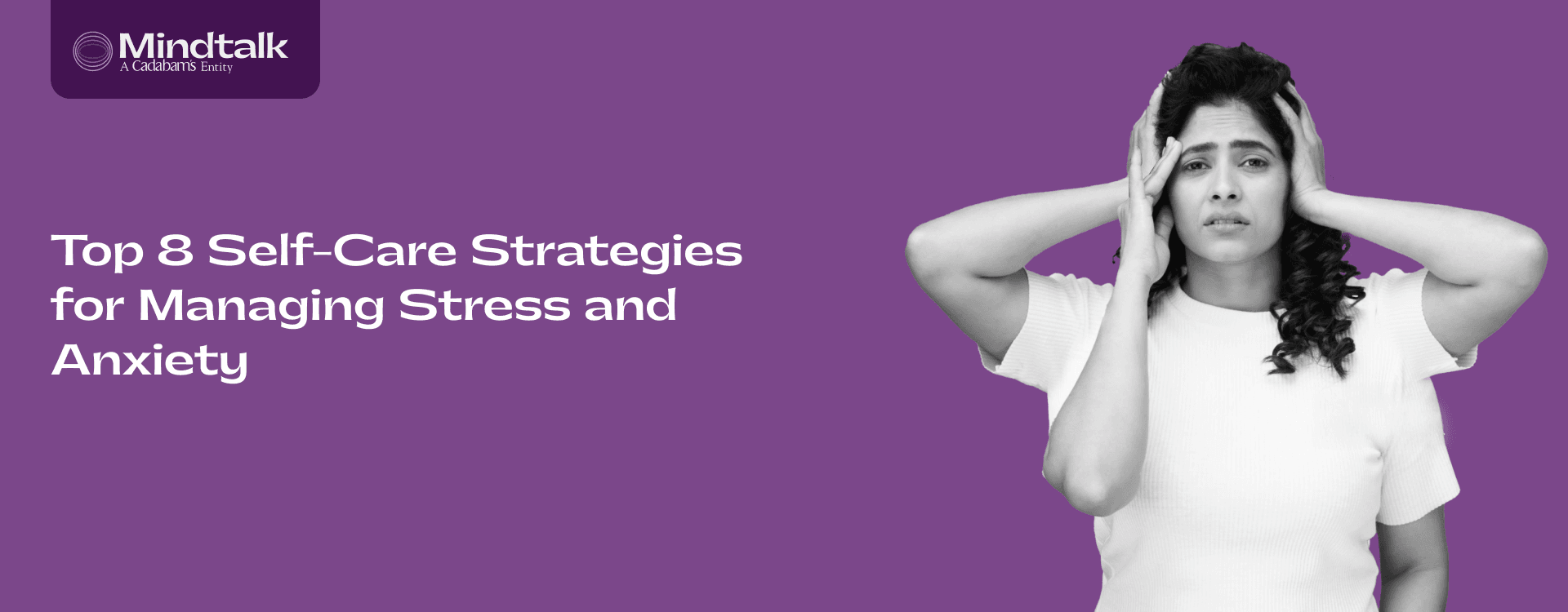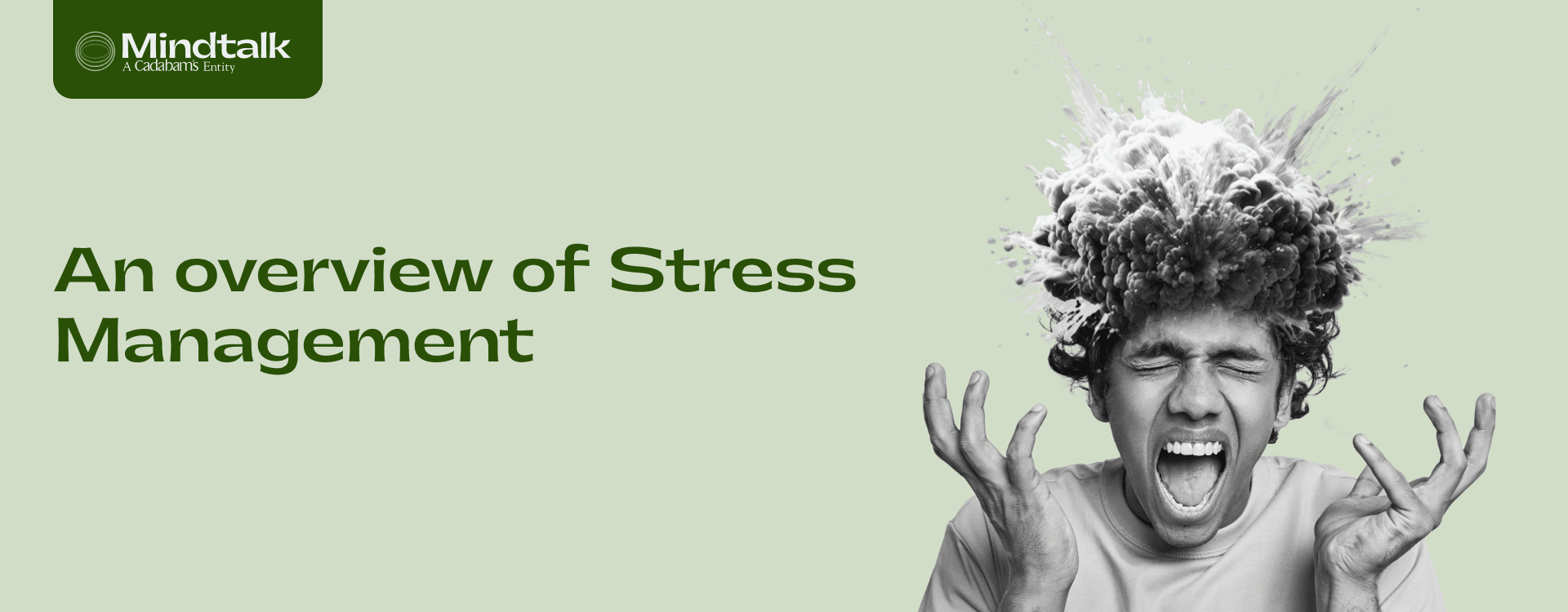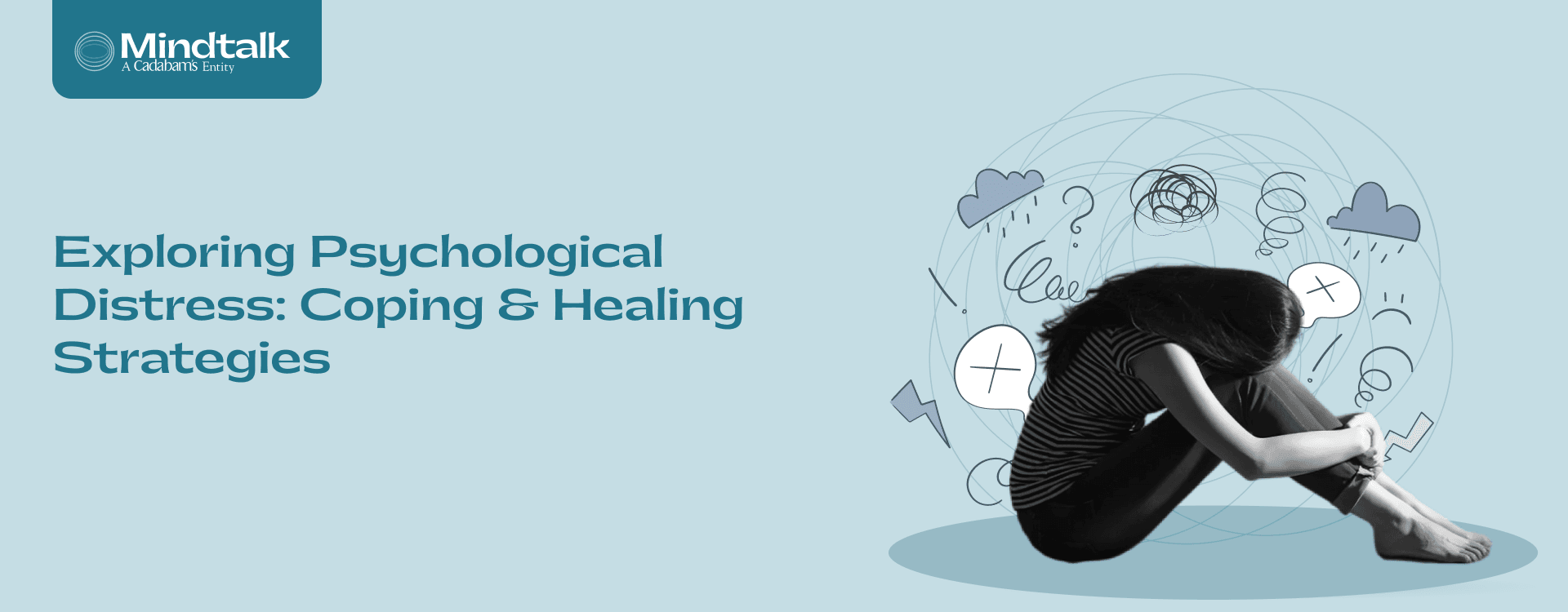Exploring Psychological Distress: Coping Strategies
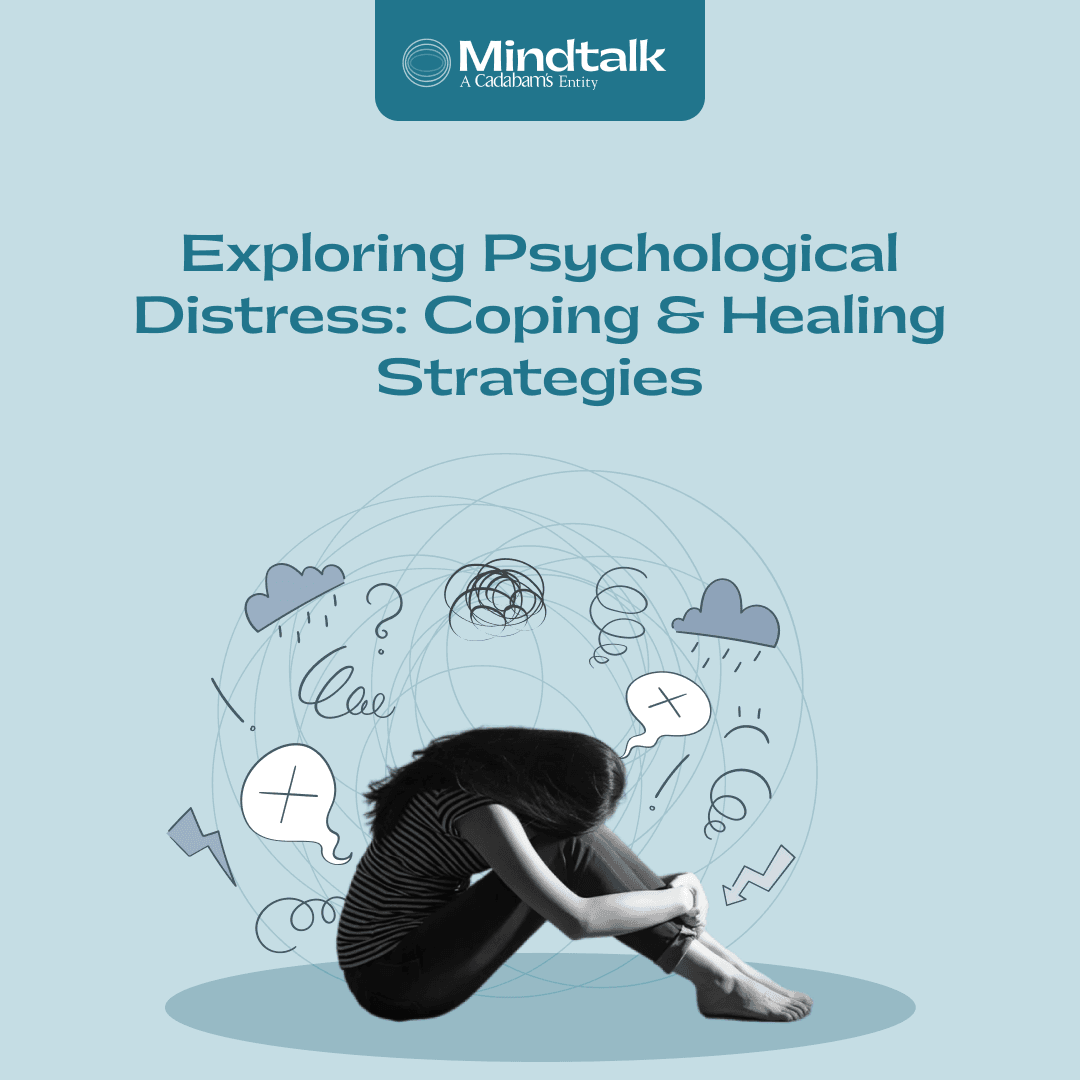
Psychological distress is a perfectly regular and essential set of symptoms that all of us face. It helps us experience the full import of our loss or pain and eventually helps us move on. However, in some cases, it could be a trigger for mental health disorders or other concerns in some people. That is why we will go through exactly what happened in detail.
Since time immemorial, few things have been common to all humans, regardless of where we come from or who we are. Our ability to feel and express distress and pain is one of them. Life, as it comes, is a journey of multitudes. With the many high points it brings, there are low points too. From early childhood to our first days in school, to our first heartbreak, to our first professional failure, and so on. And it is in these low points that we are at our most vulnerable and feel the most distressed.
So, this blog will dedicate itself to this feeling we call distress, understand its causes and implications, and how we can bounce back from it!
What is Psychological Distress?
Psychological distress refers to a state of emotional suffering typically involving symptoms like anxiety, sadness, and overwhelm.
It affects a person’s ability to cope, function, and maintain emotional well-being. Common triggers include trauma, chronic stress, life changes, or unresolved conflict. Understanding and coping with distress early can reduce long-term mental health risks.
Symptoms Of Psychological Distress
Multiple symptoms can be a marker of psychological distress in people. However, we might not be able to identify these symptoms easily until they have progressed. In situations of doubt or uncertainty, it’s always better to reach out to a trained mental health professional regarding this. The symptoms include:
Anxiety
Anxiety could be one of the first markers of a person facing psychological distress. In times of strife, we tend to start thinking about both the past and the future, leading to a sense of anxiety about what is to come. It could be the anxiety about moving on after a break-up or of finding a new job after you’ve just lost one.
Depression
While sadness is a normal part of the grieving process. It is when it persists and becomes pervasive that we call it depression. Depression could be considered a major marker of psychological distress along with the host of symptoms it brings.
Fatigue
A period of intense or prolonged psychological distress can lead to fatigue (both physical and mental). We might find it difficult to complete daily tasks and lose the drive to do things we might even have liked to do otherwise.
Contributing Factors To Psychological Distress
Contributing factors can be understood as things that may not be the cause or source of the distress but enhance the amount of distress felt by us.
Chronic Stress
Chronic stress is a severely dangerous factor for multiple reasons apart from psychological distress as well. However, in a situation involving distress, chronic stress can compound the problem and increase the sense of fatigue and anxiety a person feels.
Cognitive Patterns
Cognitive patterns play an important role in how we process any situation or information. Maladaptive cognitive patterns can enhance the impact of psychological distress and can sometimes lead a person on a downward spiral.
Substance Abuse
Misuse or addiction to a substance is also a contributing factor to the occurrence and severity of psychological distress. It can also bring a set of co-morbid consequences that can make it very difficult for a person to cope with situations that cause distress.
Causes And Risk Factors
Environmental And Social Factors
Work-Related Stress And Its Role
Employment is an important factor for survival in society, and jobs play a huge role in our physical and psychological well-being. Constantly facing stressful situations at work can contribute to a person feeling distressed. The work environment also plays an essential role along with the relationship between co-workers and management.
The Impact Of Social Relationships And Isolation
Human beings are social animals, and our relationships with people sustain and nurture us. However, in some cases, these relationships could be a source of stress, or on the flip side, people might feel isolated due to a lack of social support. All of these are contributing factors to a person feeling distressed.
Biological And Genetic Influences
Genetic Predisposition And Its Influence
Genetic predisposition also contributes to the development of psychological distress. People with a family history of mental health disorders could be at a higher risk of experiencing similar issues. Our genetic vulnerability can influence how we react to environmental stressors, potentially triggering or exacerbating psychological distress.
Physical Health Conditions And Psychological Distress
Physical health conditions could have a significant impact on mental well-being, leading to psychological distress. Chronic illnesses, hormonal imbalances, and neurological disorders can all contribute to stress, anxiety, and depression. The physical limitations and constant management of these conditions can also lead to feelings of frustration and helplessness, exacerbating psychological distress.
Psychological And Emotional Triggers
Trauma And Past Experiences
As with most things about human life, our experience plays a massive role in how we process and respond to distress situations. Having a history of trauma or troubled experiences in the past could make a person more susceptible to facing more severe episodes of psychological distress.
Mental Health Disorders
A person who is already coping with a mental health disorder could be more susceptible to facing more severe bouts of psychological distress. This could also make identifying signs of distress more difficult since symptoms of a lot of mental health disorders overlap with the symptoms of distress. Consulting a trained mental health professional is the best way forward.
How Do You Cope With Psychological Distress?
There are multiple coping strategies for those who are battling psychological distress. These include:
- Exercising regularly
- Having a healthy diet
- Adequate sleep
- Maintaining strong social relationships
- Work/Life Balance
Do note that these in themselves are not treatments or professional methods. They are merely supplementary measures that can promote recovery while you are interacting with a trained mental health professional.
Therapy Options For Psychological Distress
Brief Psychodynamic Therapy
Brief psychodynamic therapy focuses on uncovering and understanding unconscious thoughts and feelings that drive behavior. This therapeutic approach helps individuals with psychological distress by exploring past experiences and emotional traumas, facilitating insight and resolution. It encourages self-reflection and the understanding of recurring patterns, leading to emotional healing.
Cognitive Behavioral Therapy
Cognitive Behavioral Therapy (CBT) is an effective treatment for psychological distress, addressing negative thought patterns and behaviors. CBT helps individuals challenge and reframe irrational beliefs, thereby reducing anxiety and depression symptoms. It teaches coping strategies and problem-solving skills, making it a practical approach to managing various mental health issues.
Interpersonal Therapy
Interpersonal therapy (IPT) is a treatment focused on improving interpersonal relationships and communication patterns to alleviate psychological distress. It helps individuals understand and work through problematic personal relationships that may contribute to or exacerbate their mental health issues. IPT is particularly effective for depression and relationship-based emotional struggles.
How Can Mindtalk Support Someone Experiencing Psychological Distress?
At Mindtalk, we understand that people in distress need support above all else. Our professionals are trained to help you recover while crafting a treatment plan tailored to your unique needs. Our expert psychologists offer advanced therapeutic options for those battling psychological distress.
Common Psychological Distress Symptoms
Psychological distress can show up in different ways. These emotional distress symptoms may be early signs you need support:
- Constant worry or restlessness
- Trouble sleeping or eating
- Sudden anger or mood swings
- Difficulty focusing or remembering things
- Social withdrawal or isolation
- Fatigue without physical cause
- Feeling overwhelmed or hopeless
Emotional Distress Symptoms
Psychological distress manifests across the body, mind, and behaviour. Here’s how to identify the signs:
Physical Symptoms
- Headaches or unexplained aches
- Muscle tension or fatigue
- Sleep disturbances
- Digestive issues (e.g., nausea or loss of appetite)
Emotional Symptoms
- Persistent sadness or irritability
- Feelings of helplessness or worthlessness
- Emotional numbness
- Low self-esteem or frequent self-criticism
Behavioural Symptoms
- Avoiding social interaction
- Overeating or undereating
- Increased use of substances (alcohol, tobacco)
- Procrastination or lack of motivation
Recognising these symptoms early is the first step toward emotional well-being.
Effective Emotional Distress Coping Strategies
Coping with distress involves a combination of practical tools and emotional support. Strategies include:
- Mindfulness and breathing techniques
- Physical activity to regulate mood
- Professional therapy for structured support
- Building resilience to manage long-term stress
For severe or ongoing psychological distress, seeking professional help is key.
Self-Care Practices for Emotional Wellbeing
Self-care is more than indulgence, it’s emotional maintenance. Try:
- Taking short breaks to reset
- Journaling thoughts and feelings
- Daily stretching or yoga
- Spending time with supportive people
- Practising deep breathing or guided meditation
These simple steps promote emotional balance, improve self-awareness, and reduce chronic tension.
Different Types of Psychological Distress
Not all distress feels the same. Common types include:
- Anxiety – Restlessness, worry, racing thoughts
- Depression – Persistent sadness, fatigue, loss of interest
- Stress – Feeling overwhelmed by demands or pressure
These stress-related disorders often overlap, making diagnosis and treatment complex but necessary for healing.
Seeking Professional Help
Sometimes distress is more than you can manage alone.
You should consider seeking therapy if you:
- Struggle to cope with daily activities
- Experience intense or prolonged emotional pain
- Notice worsening symptoms despite self-care
- Feel disconnected or hopeless
Professional support can help you find clarity, stability, and long-term emotional recovery.
Building Resilience and Coping Skills
Resilience is the ability to bounce back from adversity. It's not about avoiding stress but adapting to it.
Building coping skills helps you face emotional distress with strength. This includes:
- Reframing challenges as temporary
- Practising gratitude
- Learning emotional regulation
- Setting boundaries to protect your energy
Over time, these habits build emotional strength and flexibility.
Stress Management Techniques
Try these practical techniques to manage everyday stress:
- Time management: Prioritise tasks and schedule breaks
- Relaxation techniques: Use progressive muscle relaxation or deep breathing
- Mindfulness: Stay present with non-judgmental awareness
- Exercise: Even a 10-minute walk improves your mood
These strategies reduce overwhelm and support emotional regulation.
The Link Between Psychological Distress and Mental Health
Chronic psychological distress can significantly impact your mental health.
It’s linked to disorders such as anxiety, depression, and even PTSD.
If unaddressed, distress can:
- Disrupt your relationships
- Weaken immunity and physical health
- Contribute to long-term emotional burnout
Early intervention through therapy, self-care, and support can prevent these outcomes.
Mental Health Professional For Stress
